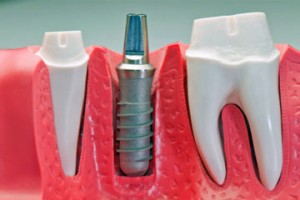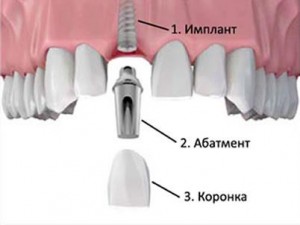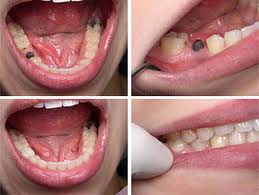Turnkey implantation

To correct defects in the teeth or dentition is possible only with the help of prosthetics.
And if some, to eliminate the shortcomings, it is enough to hide them under the tooth pads or crowns, while others require more radical measures to eliminate defects. Such a measure can be dental implantation.
Implantation is the process of implantation into the bone tissue of the jaw.
Manipulations that are performed above the level of the gums relate to prosthetics.
It often happens that a patient agrees to implantation and expects to spend a certain amount, but he does not realize that when treatment begins, he has to pay extra for various manipulations, without which it is impossible to completely restore a lost tooth.
If we are talking about the implantation of teeth under the key, then the restoration of the tooth must be performed in full.
Turnkey dental implantation includes a certain list of measures:

- Initial examination, diagnosis, x-rays.
- Anesthesia
- The implant and the operation to install it.
- Installing the stub and gingiva former.
- Abutment
- Making and fixing the crown.
The stages of implantation take place in a certain sequence.
The timing depends on the complexity of the intervention and the individual characteristics of the patient's body.
There are other options for implantation on a turn-key basis:
- Sometimes an additional fee is charged for anesthesia, x-rays, etc.
- There are also completely incorrect situations when the patient already knows in the process that the turnkey price includes only the cost of the dentist’s work, and an additional charge is required for the implant and other materials.
- The advertisement indicates the type of material for implantation that is not suitable for the patient. And for other turnkey dental implants or the necessary materials you have to pay extra.
To make it easier for the patient to understand the current situation and minimize all risks, it is necessary to discuss all the nuances with the dentist before starting treatment.
Compared with other methods of prosthetics, the advantages of complex dental implants are undeniable:
- Implantation allows you to replace lost teeth in full. The implants are installed in such a way that the load on the jaw is evenly distributed.
- During the dental implantation procedure, there is no need to grind healthy abutment teeth, which is important for maintaining their health.
- Implants are fully consistent with the patient’s natural teeth, which is not always possible to achieve with the installation of crowns or other prosthetics.
- Implants are a reliable means of fastening various designs.
- Dental implants prevent the atrophy of the jaw bones.
Video: “Installation of the implant”
Types of implantation
Express implantation (one-stage)
It consists in the fact that after tooth extraction an implant is immediately placed.
Indications for express implantation:
- Tooth injury with deep damage to gum tissue.
- The inability to restore the tooth.
Benefits:
- Reduces the time spent on treatment.
- Reducing visits to the dentist, worries and pain. At the same time, tooth extraction and implant implantation are performed.
- It is possible to immediately install a temporary crown.
Installing the implant in a one-step way reduces pain due to the absence of the need to cut the gum, followed by suturing.
As a result, the number of visits to the dentist in the postoperative period is reduced.
Two-stage implantation

It is carried out more often than one-stage.
- At the first stage, the implant is implanted into the bone tissue of the jaw, after its engraftment, a support is placed on the screw.
- The second stage involves the installation of a permanent dental crown on a support.
Turnkey implantation, carried out in two stages, is longer than one-stage implantation.
However, this method is the only way to restore the dentition, because the patient may have contraindications for surgery.
The advantage of this method is the possibility of replacing the crown in case of damage, while the implant for one-stage implantation is an integral structure.
Cost
In one-stage and two-stage implantation, the cost of a dental implant depends on its manufacturer, and the price of implantation is determined by its type, volumes of the preparatory stage of prosthetics, the degree of complexity of the procedure, and other factors.
The cost of implanting a turnkey tooth implies that an abutment will be installed on the implant, and a crown on top. In this case, the cost of installing the prosthesis should be included in the previously announced price.
- The total cost of turnkey implantation depends on the cost of the material from which the implant, abutment and dental crown are made.
- If the advertisement was about one material, and the patient wants to install another material, then you will have to pay the difference in their cost.
- A package of services usually does not include the cost of bone plate surgery. Its cost is quite high and this also needs to be considered when planning the costs associated with implantation.
Price comparison
Turnkey dental implants, prices which are reduced annually, today is one of the highest quality dental restoration procedures.
The implantation guarantee is on average 10 years and depends on the quality of dental work performed and the qualifications of the doctor.
| Service list | Cost |
| Mirell implant (Israel), gingiva former, ceramic-metal crown with conventional fixation | 21000 |
| Mirell implant (Holland), cermet crown with screw fixation, gingival former | 23000 |
| Nobel implant (USA), healing abutment, ceramic-metal crown | 40000 |
| Nobel implant (Sweden), zirconia crown, gingiva former | 53000 |
